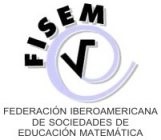Ingeniería didáctica para la secuencia s generalizada de Jacobsthal y la (s, t) -secuencia Jacobsthal generalizada: análisis preliminares y a priori
Resumen
The present work describes the initial two stages of a classical Didactical Engineering with the theme related to properties of the Generalized Sequence of Jacobsthal and the (s,t)-Generalized Sequence of Jacobsthal. Admittedly, such notions were, recently, introduced in the scientific literature by Anatassov (2011; 2012). However, some combinatorial properties can be identitied and investigated with a computational resource. Finally, two problem situations are described, so that the Theory of Educational Situations - TSD was used in order to indicate possible interactions that must be explored involving the trinomial - teacher - knowledge - students. Finally, the work presents a summary table of the properties verified by mathematical induction and that have not been discussed in the scientific literature until the moment, involving process of numerical extension of the respective indices.
Descargas
Citas
Almouloud, Ag Saddo. Fundamentos da Didática da Matemática. São Paulo: Editora UFPR, 2007.
Almouloud, Ag Saddo & Silva, Maria. J. F. Engenharia didática: evolução e diversidade. REVEMAT: Revista Eletrônica de Educação Matemática, v. 7, nº 2, 2012.
Almouloud, Ag Saddo. Modelo de ensino/aprendizagem baseado em situações problemas: aspectos teóricos e metodológicos. REVEMAT: Revista Eletrônica de Educação Matemática, v. 11, nº 2, 109 – 141, 2016.
Alves, Francisco, R. V. Engenharia Didática para a generalização da Sequência de Fibonacci na disciplina de História da Matemática: uma experiência num curso de licenciatura. Educação Matemática Pesquisa, v. 18, nº 1, 61 – 93, 2016a. Recuperado el 10 de abril de 2017, de https://revistas.pucsp.br/index.php/emp/issue/archive
Alves, Francisco, R. V. Descobrindo definições matemáticas no contexto de investigação histórica: o caso da Sequência Generalizada de Fibonacci. Boletim GEPEM, nº 68, 1 – 5, 2016b. Recuperado el 10 de abril de 2017, de http://www.ufrrj.br/SEER/index.php?journal=gepem&page=issue&op=archive
Alves, Francisco, R. V. Sequência Generalizada de Pell – SGP: aspectos históricos e epistemológicos sobre a evolução de um modelo. Revista THEMA. v. 13, nº 2, 27 – 41, 2016c. Recuperado el 10 de abril de 2017, de http://www.fisem.org/web/union/images/stories/29/archivo13.pdf
Alves, F. R. V. Didática de Matemática: seus pressupostos de ordem epistemológica, metodológica e cognitiva. Interfaces da Educação. v. 7, nº 21, 131 – 150, 2016d. Recuperado el 10 de abril de 2017, de http://periodicosonline.uems.br/index.php/interfaces/issue/view/109/showToc
Alves, Francisco. R. V. Sobre a evolução histórica do modelo de Fibonacci: a classe das funções hiperbólicas de Fibonacci. VYDIA Educação. v. 35, nº 1, 133 – 146, 2015. Recuperado el 10 de abril de 2017, de http://www.periodicos.unifra.br/index.php/VIDYA/issue/archive
Anita, A.Gnanam, B. (2016). Negative Jacobsthal Numbers. International Journal of Science, Engineering and Technology Research (IJSETR). v. 5, nº 3, 663 – 665.
Artigue, M. (1996). Ingénierie Didactiques. Brun, J. (org.). Didactiques de Mathématiques, 243 – 264. Lagrange J.B. & al. (eds). Jun 2003, Reims, France.
Artigue, M. (2009). Didactical design in Mathematics Education. Carl Winslow (eds). NORMA08, Copenhaguen: Sense Publishers, Denmark, 7 – 16.
Arlsan. S. & Koken, F. (2016). The Jacobsthal and Jacobsthal-Lucas Numbers via Square Roots of Matrices. International Mathematical Forum, 11(11), 513 – 520. Recuperado el 15 de mayo de 2017, de http://www.m-hikari.com/imf/imf-2016/9-12-2016/p/kokenIMF9-12-2016.pdf
Brousseau, G. (1986). Fondements et methodes de la Didactiques des Mathématiques. Recherche en Didactiques des Mathématiques. 7(2), 33 – 115.
Brousseau, G. Les obstacles épistémologiques, problèmes et ingénierie didactique. G. Brousseau, (org.) (1998). Théorie des situations didactiques. Grenoble La Pensée Sauvage, 115 – 160.
Chevallard. Y. (1991). La Transposition Didactique. Paris: La Pensée Sauvage Édition.
Jacobsthal, E. (1919 – 1920). Fibonaccische Polynome und Kreisteilungsgleichungen. Berlinger Mathematische Gesellschaft. Sitzungsberichte. v. 13, 43 – 57.
Horadam, A. F. (1996). Jacobsthal representation numbers. The Fibonacci Quarterly, v. 34, nº 1, 40 – 55.
Koken, F. & Bozkurt, D. (2008). On the Jacobsthal Numbers by Matrix Methods. Int. Journal Contemp. Math. Sciences, 3(13), 605 – 614. http://m-hikari.com/ijcmspassword2008/33-36-2008/kokenIJCMS33-36-2008.pdf
Margolinas, C. (1995). Dévolution et intitutionnalisation: deux aspects antagonistes du rôles du maître. Comiti, C.; Bessot, M. P. Didactiques des disciplines scientifiques et formation des enseignants, 342 – 347.
Robinet, J. (1983). De L´ingenierie Didactiques. Les Cahiers Blancs. 1(1), 1 – 11.
Siegmund-Schultze, Reinhard. (2009). Mathematicians Fleeing from Nazi Germany: Individual Fates and Global Impact. Princenton: Princenton University.
El material publicado en la revista se distribuye bajo una licencia Creative Commons Reconocimiento Internacional 4.0 (CC-BY 4.0). Esta licencia permite a otros distribuir, mezclar, ajustar y construir a partir de su obra, incluso con fines comerciales, siempre que le sea reconocida la autoría de la creación original. Los autores de los trabajos publicados en Revista Unión retienen el copyright de los mismos sin restricción alguna.
Publicado 2017-12-19







.png)






